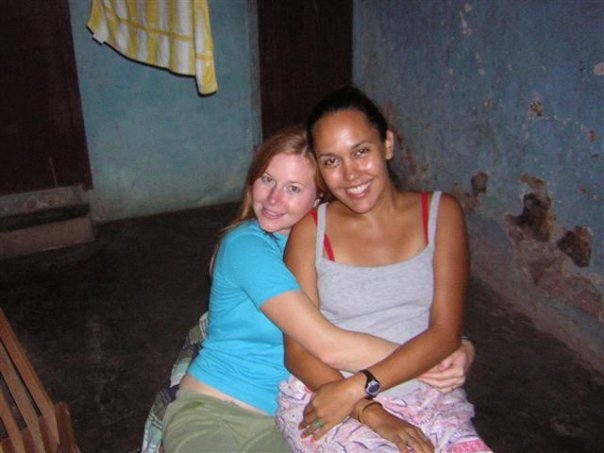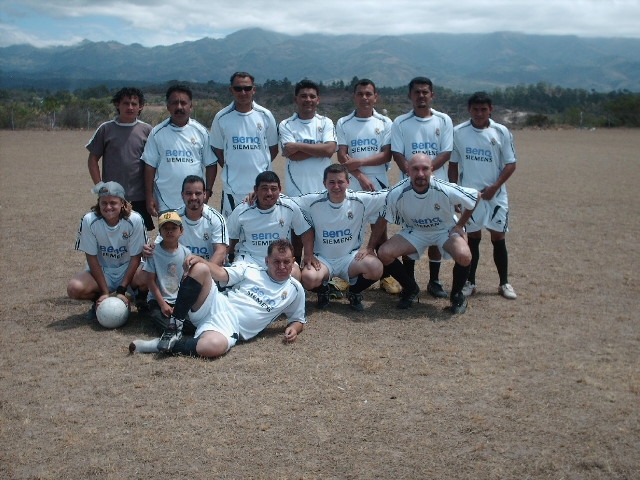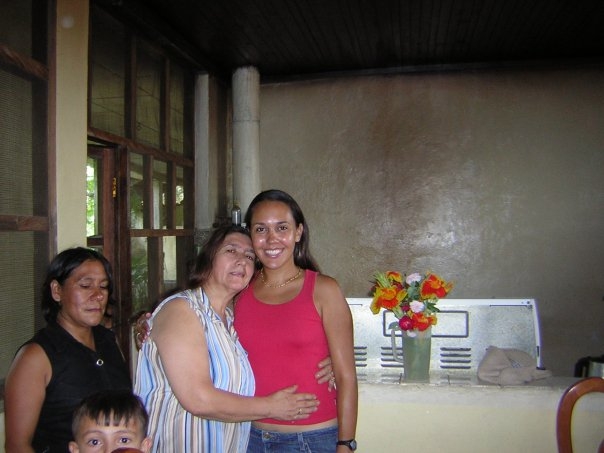For the past few days my Facebook News Feed has been saturated with updates and links from my friends about Peace Corps officially leaving Honduras due to an increase of violence in the country. I've read many recent articles which name Honduras as having the highest murder rate per capita in the world. Apparently, Peace Corps will also stop sending volunteers to Guatemala and El Salvador, thus eliminating the program completely from the "northern triangle" of Central America. This news awakens mixed emotions for me, primarily sadness, as I know it does to all the other volunteers that served in Honduras.
I was a Peace Corps Volunteer in western Honduras from 2006-2008. It's been, so far, the best years of my life. I lived in a small town tucked in between mountains, as if an afterthought from God, without paved roads, where the number of livestock outweighed the cars. My house, like most, had no modern appliances so I scrubbed my clothes by hand and hung them to dry on clothes lines tied to trees under the sun.
I took warm showers by installing an "electro-ducha" in the shower, meaning that every time I bathed my water was being warmed by electricity that was literally connected to the shower head right above my body. I always made it a point not to touch the wires that were dangling about.
During my first year as a volunteer I was blessed to have a great site mate and we spent a significant amount of our free time in our shared back porch, reading books, sipping coffee made from the roasted beans of our neighbors' farms, or drinking rum.
This post is my way of coping with the loss. If it sounds corny and contrived, then clearly you are not a Peace Corps volunteer. I feel like I've just been dumped. I'm going to go drink a bottle of wine now and tomorrow all of my fifth graders that are Honduran will be getting extra credit just because. I love you, Honduras!
*This is not a public service announcement but if you've been moved by what you've just read please consider donating to my mother's non-profit, Walking for Peace; Scholarships to educate financially disadvantaged Hondurans so they can become the foundation for the help their country needs*
I was a Peace Corps Volunteer in western Honduras from 2006-2008. It's been, so far, the best years of my life. I lived in a small town tucked in between mountains, as if an afterthought from God, without paved roads, where the number of livestock outweighed the cars. My house, like most, had no modern appliances so I scrubbed my clothes by hand and hung them to dry on clothes lines tied to trees under the sun.
I took warm showers by installing an "electro-ducha" in the shower, meaning that every time I bathed my water was being warmed by electricity that was literally connected to the shower head right above my body. I always made it a point not to touch the wires that were dangling about.
During my first year as a volunteer I was blessed to have a great site mate and we spent a significant amount of our free time in our shared back porch, reading books, sipping coffee made from the roasted beans of our neighbors' farms, or drinking rum.
When we weren't nestled in our cave we could be found at our next door neighbor's house, Dona Hilda, gossiping and being fed. Hondurans love to feed gringos. But the food was so good that I couldn't resist and I ate virtually everything that was offered to me. Local, organic fare that we in the U.S tend to think of as frivolous and expensive were the norm in the small farm town where I lived.
There wasn't another option. Eggs from real free range chickens that aren't being pumped with steriods; creamy milk fresh from the cow's udder, cheese made by hand from that very same milk (which here is called artisanal cheese and is considered gourmet!), and tortillas - corn tortillas made fresh every single morning. In my mind I can still hear the sounds of tortillas being slapped and pounded into shape, the daily forearm muscle toning Honduran women do without being privy to the exercise. Needless to say, I gained about thirty pounds throughout those two years.
I've since lost the weight but I can't help thinking that I had a better self image of myself when I was heavier living in Honduras. Having the luxury to be without television, magazines, and internet service meant I was able to forget about the trends and celebrity fawning typical of the U.S culture and the ever-exhausting female task of fitting in. I was able to be at peace with my self and concentrate more on matters of the mind and heart. Honduran men and women complimented my widening figure, calling me "gordita" and meaning it as curvaceous instead of as fat. I truly believe my self esteem was better in Honduras, even if I couldn't button my pants.
In fact, I was so confident in Honduras that I was able to make this hot man fall in love with me faster than it takes to drive one mile in Miami during rush hour:
It took me longer and many I-like-you-but-I-don't-want-a-relationship starts and stops until I realized that I had fallen in love, too. And then things went swimmingly. I'm lucky that Chris is as stubborn as I am and didn't give up on my fickleness. It's hard enough for me to decide what to wear to work every morning, and shopping for one single pair of boots recently took about a month, so you can only imagine the challenge I faced when deciding if my feelings for Chris were love or not. The laid back atmosphere of Honduras gave me the time I needed, without distractions, to get to know him on a leisurely rate without having to rush. I know I made the right decision.
Through Chris I vicariously experienced a different side of Honduras that is reserved for men only - namely soccer playing, drinking, working the land, and the camaraderie that accompanies it all. I learned Spanish slang and curse words, which, although I am a fluent speaker of the language, had never been taught. I learned to use the subjective pronoun "vos", which is usually reserved for use between family members, close friends, and men in conversation with other men.
In Honduras people treated me with an awkward deference because I was a foreigner and they assumed that I was rich and educated. I was often referred to as "Doctora" and "Licenciada" in my town; the former translating, easily, to "Doctor" and the latter meaning, loosely, "One who has graduated from college and holds a degree of some sort". I was happy about the respect that I received but slightly disheartened that not even my closest Honduran friends were comfortable enough with me to use the more laid-back "vos" instead of the usual "usted" that I always received.
But Chris, and apparently most of the male volunteers, easily broke through the "vos barrier" and became very good friends with the Honduran males in their respective towns. He even joined a soccer team - the only gringo in his area to play.
I envied Chris and his Honduran rapport but I also understood it. Honduras, especially the bucolic areas, are largely chauvinistic. The attitude toward women there is about where the U.S was in the 1960s: Their duties are entirely domestic, they are expected to be virginal and uneducated, and they don't drink or smoke (at least not in public).
For us female volunteers it was very difficult to transition our independent behavior to fit the cultural norms of Honduran women, so we mostly kept to ourselves when we weren't working or visiting with neighbors. There was only one Honduran woman in my entire town of 15,000 people with whom I ever felt comfortable drinking alcohol. Incidentally, she was also the one to teach me many curse words and dirty jokes.
My time in Honduras wasn't entirely without some modern influence on the locals. As a health volunteer I taught hundreds of classes on the reproductive organs, safe sex practices, HIV and AIDS prevention, and maternal health issues. A few times a week I empowered women to talk and think about sex and protecting their own bodies. I educated secondary school students in how to make the right choices for a better future, primarily by preventing pregnancies and sexually transmitted diseases. I co-led a group for People Living with HIV and AIDS about acquiring and maintaining healthy habits for their minds and bodies. I made billboards for the maternal health clinic. I developed a safe sex workshop for a group of military men. I helped the local clinic vaccinate children. I spent a week translating for a group of American doctors on a health mission. I almost participated as a translator for the same doctors during the surgery of a young boy who had an undescended testicle, but at the last minute the hospital ran out of anesthesia so the surgery had to be postponed. So, although the majority of Hondurans I knew during my two years in the Peace Corps never referred to me informally as "vos", I still managed to create strong ties with them through my work, ties which will hopefully lead to them making wise and informed decisions about their bodies. Even if only one out of the many people I educated remembers, and uses, what I taught them then I feel satisfied with the job I did while serving in the Peace Corps.
The informal and silly behavior that I craved, but never truly got from Hondurans in my own age group, was given in heaps by the other volunteers. Whenever we could spend time together we eagerly jumped at the chance. I have never felt as carefree and excited as I did socializing with other Peace Corps volunteers in Honduras. We all went through such similar experiences assimilating to the culture that it was such a relief to be able to talk about our particular issues and finally relax and be ourselves. And let loose we did. There are two types of friends in my life, my friends before and after Peace Corps, and my Peace Corps friends. I love both types very much, but not equally. There is something particularly strong about the love I feel for my Peace Corps friends. The bonds that are created between people that share the same odd experiences in a foreign land, much like what I imagine to be the relationship between soldiers, are seemingly unbreakable. I can spend months without speaking a word to one of my Peace Corps friends, but the moment the silence is broken all the time that passed seems to disappear. We really do just pick up right where we left off. There's a raw honesty and sense of absolute comfort with my Peace Corps friends that I have only ever felt with members of my own family, and that's one of the main highlights of my experience in Honduras.
The termination of Peace Corps in Honduras has made me nostalgic and searching through my computer files for pictures to use on this blog has turned that nostalgia into fantastic memories. But it's also made me worry for the future of Honduras, and Central America in general. That violence has existed in Honduras for many years, even during my service, is a fact. But I was fortunate enough to never once have been in fear for my life or have anything stolen from me. In fact, I once, accidentally, left my front door wide open while I ran some errands around town. When I returned I found everything in my house, including my laptop, exactly where I had left it. I also hitchhiked all over the country and never felt that I was in any danger. I know other volunteers witnessed and/or were involved in some terrible crimes, but nothing ever happened to me. That the situation in Honduras has escalated out of control that Peace Corps had to pull out of Honduras for the first time in fifty years is heart breaking. That life is getting harder for the Hondurans I know, that treated me so kindly, saddens me.
That I have such fond memories of Honduras while real Hondurans are practically sacrificing their lives to escape their country, or are succumbing to great injustices there, leaves me feeling guilty. And that future Peace Corps volunteers will not be able to enjoy the beautiful country of Honduras as I did makes me pity them.
This post is my way of coping with the loss. If it sounds corny and contrived, then clearly you are not a Peace Corps volunteer. I feel like I've just been dumped. I'm going to go drink a bottle of wine now and tomorrow all of my fifth graders that are Honduran will be getting extra credit just because. I love you, Honduras!
*This is not a public service announcement but if you've been moved by what you've just read please consider donating to my mother's non-profit, Walking for Peace; Scholarships to educate financially disadvantaged Hondurans so they can become the foundation for the help their country needs*












































